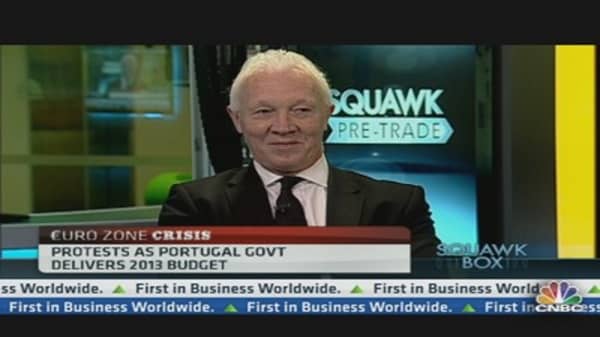Europe faces a winter of discontent as austerity cripples southern Europe and heightens public anger over measures taken to soothe policymakers in Brussels, Alastair Newton, Senior Political Analyst at Nomura told CNBC Tuesday.
Strikes and protests, many of them violent, have swept across southern Europe in recent months as the public reacts to tax cuts and other measures which have deepened the recession and increased unemployment in Greece and Spain in particular.
"We're heading towards a second winter of discontent and across the euro zone. We are going to see rising civil unrest. We've seen a long trend of anti-incumbency across Europe.
Many of the coalition governments across southern Europe are weak and there is every chance that the Portuguese government won't last full term, " Newton said.
He added that this sentiment would worsen because the euro zone agenda was being driven by what is best for the German election cycle rather than individual countries' needs, "It is delay, delay, delay [and] it's not good.
The German elections are a year away but every decision that I see being made in Berlin, or non-decision, is giving consideration to the German political cycle.
Merkel is trying to delay a vote on Greece and Spain at the moment so that it can put into one package, one vote and one chance of it to go wrong, " he said.
Protesters reacted angrily to the Portuguese government's announcement of its harshest budget on record for 2013 as it strives to meet the strict conditions of its international 78 billion euro bailout ($100 billion).
There are fears that the measures which include a number of tax rises as well as cuts to what is seen as a bloated public sector will further exacerbate the country's recession.
Supporters of the budget claim it merely brings Portugal in line with many standard measures in Northern Europe.
"Even in the good years Portugal's growth rate was pretty parlous just around 1 percent – it needs to learn how to grow competitively, it's just not competitive, even putting austerity to one side, " Newton said.
Despite the on-going lack of resolution to the crisis Newton said the Germans appetite for a Greek exit had abated despite the fact that the country has been dogged by "Grexit" rumors for more than a year.
"For the moment it seems like the Greeks are staying in, Angela Merkel [German chancellor] seems to have decided that the economic consequences are not worth it – changing her mind for at least the second time in the last six months, " Newton said.
However he warned that there would be big question marks on whether the Greeks could hit their numbers whatever slack goes their way.
Bailout Fatigue
Talk of various countries leaving the euro zone has intensified over the last few months as core northern European countries and their electorate tire of the ongoing crisis and the financial burden of keeping struggling economies afloat.
"Bailout fatigue is gripping the Netherlands and Finland and Merkel has to keep that in mind. It's not going to be easy to hold this together, " Newton said.
Nicholas Spiro, managing director at Spiro Sovereign Strategy told CNBC.com that any meaningful action on shoring up the euro zone would not take place until the December summit.
"There's unlikely to be any meaningful progress in the euro zone until December and even this could prove disappointing.
A degree of complacency has set in following the ECB's pledge to buy unlimited amounts of short-dated Spanish and Italian paper, " Spiro said.
He added that he did not see a Greek exit in the short term but said policymakers were "unwilling to take the necessary steps to secure Greece's membership of the single currency area."
By CNBC's Shai Ahmed, Follow her on Twitter @shaicnbc



